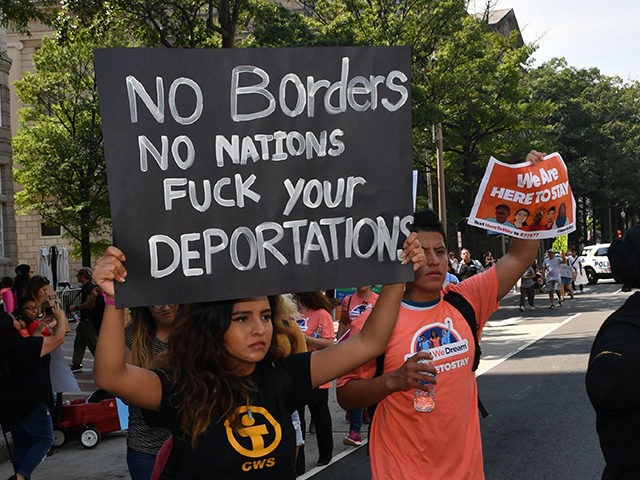President Donald Trump carefully distanced himself from his unpopular amnesty proposal late Saturday night, saying that it is intended to show the GOP’s sincerity and the Democrats’ cynicism and obstructionism.
The giveaway amnesty deal was instantly and universally slammed by the Democrats’ ethnic and progressive activists, although Democratic leaders were careful to pocket the uncapped amnesty offer while demanding yet more concessions. The proposal emerged as Senate Minority Leader Sen. Chuck Schumer told the New York Times that he had agreed to fund wall construction in a face-to-face meeting with Trump while privately believing he could not deliver on the deal.
Trump’s pro-American voters were hostile to the amnesty offer, which opens the door to a massive, unregulated, unending amnesty of far more than 1.8 million illegals.
The amnesty would greatly help business groups and their lobbies, such as the Koch brothers, partly by aborting widespread wage raises before the November election. Trump’s top congressional aide, Marc Short, is a former senior aide to the Koch brothers.
The deal offers little to American employees and parents because the job-market gains when illegals are blocked by the wall would be more than offset by the huge amnesty and by the continued inflow of foreign workers and chain-migration relatives. The amnesty bill does not include an upper cap on the number of illegals to get amnesty, nor does it set a date when the amnesty would end.
Trump could put his amnesty offer on hold and instead ask voters in November to pick either his popular immigration policy or the Democrats’ very unpopular, easy-immigration agenda.
By subscribing, you agree to our terms of use & privacy policy. You will receive email marketing messages from Breitbart News Network to the email you provide. You may unsubscribe at any time.
That Democratic agenda includes the demand that the hugely valuable prize of citizenship be granted to the 3.25 million ‘dreamer’ illegals, their parents and millions of additional illegals, regardless of the economic and civic impact on 320 million Americans and legal immigrants who are dreaming about their futures — and their children’s futures.
That pro-illegal agenda was displayed mid-January when Senate Democrats shut down the federal budget — including the defense budget — while demanding an amnesty. The Democrats were forced to retreat amid growing public opposition, unexpected GOP criticism, and Trump’s sharp-elbowed Tweets.
If the Democrats’ unpopular immigration agenda is not put on the ballot in November, GOP turnout may not be anywhere high enough to offset turnout by the many Democrats who are still enraged by Trump’s defeat of their candidate in November 2016.
Instead, an approved amnesty law would likely cause an avalanche of illegals to head north during the 2018 election campaign, so discrediting Trump’s claim to have solved the illegal immigration problem. The draft amnesty bill bars immigration officials from deporting migrants until they have applied for the amnesty.
Without high and enthusiastic turnout of 2016 Trump voters, the chance of GOP success in November would drop, and the chance of a 2019 impeachment of Trump by Democrats would rise.
Polls show that Trump’s American-first immigration policy is very popular.
For example, a December poll of likely 2018 voters shows two-to-one voter support for Trump’s pro-American immigration policies, and a lopsided four-to-one opposition against the cheap-labor, mass-immigration, economic policy pushed by bipartisan establishment-backed D.C. interest-groups.
Business groups and Democrats tout the misleading, industry-funded “Nation of Immigrants” polls which pressure Americans to say they welcome migrants, including the roughly 3.25 million ‘dreamer’ illegals.

COMMENTS
Please let us know if you're having issues with commenting.